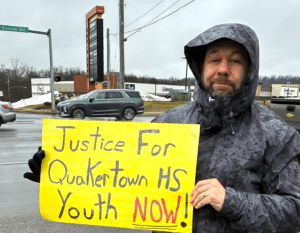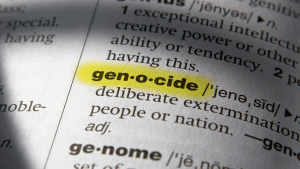Bucks County has one of the highest eviction rates in the commonwealth. Eighth out of 67. If Housing and Urban Development (HUD) Secretary Scott Turner gets his way, the number of people losing their homes in the region – and all across the nation – will go even higher.
A recent story by the Associated Press sounded the alarm about a New York University study predicting federal policy changes. The Furman Center warned that HUD might impose two-year limits on the length of rental subsidies for low income families, impacting not only working parents but their landlords as well.
“That’s going to be devastating. They’re coming right back to homelessness,” said Murielle Kelly, director of Housing Services for Family Service Association of Bucks County. Kelly predicts that none of the low wage tenants she’s helped find HUD housing will be able to pay the difference if their vouchers are canceled. “It’s not helpful. I mean, you’re putting people right back into the same situation. You helped them and now you’re putting them back.”
Section 8 – the name of the program providing rental subsidies to low-income families – requires tenants to pay, on average, 30 percent of their incomes, while the federal government pays the rest.
People can’t afford the cost of living. If people only make minimum wage, maybe they used to be able to afford a one-bedroom apartment for $800,” Kelly explained. “But now, that same one-bedroom has now increased to $1,400. How are they going to afford this? And they have children!”
Kelly has spent the last few days reeling from the news that all Housing Choice (Section 8) Vouchers for the county have been put on hold. No one from the waiting list can be leased up, and now the people who do have apartments may lose them. “We are creating a system that, if anything, is adding to the problem. I mean cutting vouchers, removing people’s vouchers, I don’t think that’s going to work.”
In 1999, in an attempt to take the federal government out of the direct housing business, Congress passed the Faircloth Amendment forbidding the building of any new publicly owned housing units. Since then, HUD has cut the number of units by 227,000 from those 20th century totals, even though the number of people in poverty has increased by 18 percent.
Consequently, about twice as many subsidized housing units are in private property with direct payments going to commercial property owners. The federal portion of Section 8 goes directly to the landlord. No taxpayer dollars are paid to the tenant, and the tenant is required to pay their portion straight to the landlord, as well. Across the U.S., private property owners of 2.3 million units have a regular steady income via their HUD tenants.
If the two-year limit is enacted, in Pennsylvania alone, thousands of private landlords will find themselves renting to people who can no longer afford to live in their units.
According to the Housing Alliance of Pennsylvania, more than 90 percent of evictions are a result of folks not paying their rent. And while – at present – very few of those are HUD recipients, fewer than 6 percent of evictions in the commonwealth are people in subsidized housing – that could all change if the federal government ceases to support the needs of Section 8 recipients.
READ: Nearly 1 in 3 Families with Children in Bucks County Are Struggling Economically, Says New Report
Secretary Turner says that limiting assistance will curtail fraud and abuse as well as move the affected families toward self-sufficiency.
MJ – a landlord in Allegheny County who preferred to go by initials out of fear of being blacklisted – predicted quantifiable pain for most of his tenants. “I’ve been in business for 30 years. I’ve been a Section 8 landlord for a very long time. So far, I have only seen two families that have come out of Section 8 and become, you know, self-sustaining.”
Alexis Crue of Lehigh County has only one Section 8 unit. She leases an apartment in neighboring Cambria County to a hard-working single mom. Because of how long the woman struggled waiting for housing, Crue knows that if she lost her subsidy, she wouldn’t be able to pay the rent. “My tenant on Section 8 is in year two right now, and she’d been on the waiting list … seven years before she got to me.”
And Crue likes being her landlord. “She’s a great tenant. If I have to check on the property even if she’s not there, she says that I’m more than welcome inside. I’ve seen the inside. It’s very clean.”
Asked what she’ll do if the two-year limit is imposed, Crue explained, “Turnover always costs money. It can be like, you know, as high as five grand depending on the place. Just painting a place could easily cost a couple thousand.”
All those costs will add up quickly for big property owners like MJ. He said that he’s “only had a couple lease up in the last two years.” The vast majority of his units have been leased far longer – those folks will no longer be able to afford to live – and he’ll have to “turnover” nearly every unit. “It would be a total nightmare. It will completely destroy my business.”
If tenants try to stay but can’t afford the other 70 percent of the rent, MJ predicts that evictions will skyrocket.
Robert Kim, Staff Attorney for Legal Aid of Southeastern PA, agrees with the prediction. “I would imagine the number of evictions would increase. If they are barely scraping by paying a third of their income for rent, then [potentially must] pay all their income for rent. I imagine it would be hard to survive.”
And more evictions would place an even greater burden on their legal aid office as they help impoverished tenants navigate the system. “Right now, we have about three staff attorneys on to handle evictions in Bucks County. I imagine [our cases] would increase significantly because they only come to us under crisis. I imagine the amount of folks in crisis would increase.”
When asked how long tenants who lost their housing subsidy might be able to stave off homelessness, Kim replied, “I guess it takes about 30 to 40 days.” The landlord would file for eviction and, Kim said, it takes a week or two to get a hearing. “If the judge rules in the favor, the tenant has to file an appeal within 10 days.” But an appeal is only granted if the tenant continues to pay their rent into an escrow account set up by the Court of Common Pleas. Money they didn’t have to begin with. Kim concluded simply, “It would be hard if they don’t have the ability to pay rent, to avoid eviction.”
MJ agrees and he’s not just thinking about all the evictions he’d have to initiate. He’s staggered by the enormous potential for harm. “This will completely eliminate housing for millions of people that are dependent on this program. It’s going to be completely devastating.”







